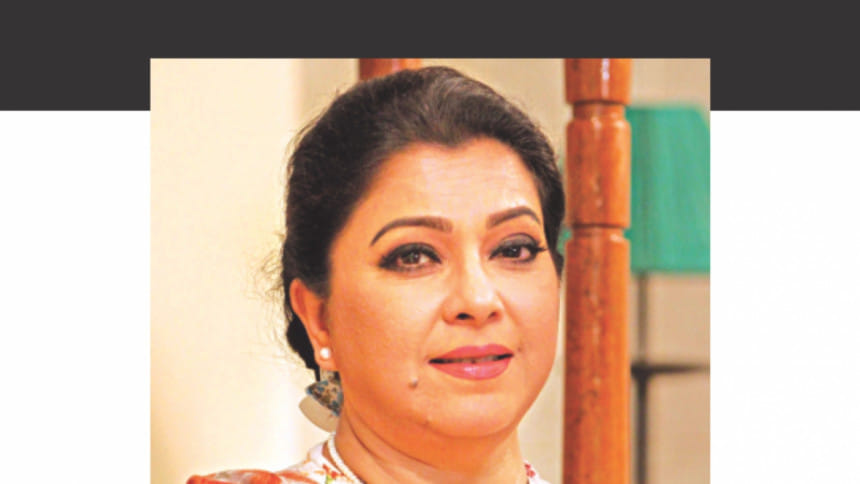Actress Diti loses battle with cancer

From a simple small town girl with dreams of becoming a singer, she became one of the biggest film stars of her era. And much like the action heroine roles that she made a name for herself with in the '90s, Parveen Sultana Diti was a fearless fighter for most of her life, until the battle with brain cancer got too big on her on March 20, just 11 days before her 51st birthday.
One of the most recognisable faces of Bangladeshi cinema breathed her last at the capital's United Hospital yesterday afternoon, leaving behind countless unforgettable moments on the silver screen, and an army of ardent fans.
She would be taken to her Gulshan residence at 8:00am today and to Bangladesh Film Development Corporation (BFDC) at 10:00am. Diti will be laid to rest at her family graveyard in Sonargaon of Narayanganj in the afternoon, according to the family.
Born on March 31, 1965 in Sonargaon, Diti aspired to become a singer, and was even awarded at a national competition by the Shishu Academy.
While singing for Bangladesh Television, she first drew the attention of actor Al Mansur, who cast her in the TV drama "Laili Majnu" opposite Manas Bandopadhyay.
Despite her family being not entirely supportive in her new ventures, she worked in another TV play "Imitation", before taking part in a talent hunt "Notun Mukher Sondhane" by the BFDC in 1984, and winning it, alongside Sohel Chowdhury.
Her first work for film was Udayan Chowdhury's "Daak Diye Jai" (opposite Afzal Hossain) but the film never saw the light of day, and Ajmal Huda Mithu's "Ami-e Ostad" marked her debut on the big screen.
But it was her story with Sohel Chowdhury that deserves a film adaptation in itself. After winning the talent hunt, the two were cast in Amjad Hossain's "Hiramoti", an adaptation of famous Punjabi tragic romance "Heer-Ranjha". The picturesque locations of Sylhet and Jaflong where the film was shot created a spark between the two, and Diti eloped from her house to marry Sohel. The duo went on to co-star in a few other films, most notably "Chirodiner Sathi".
While Diti's career saw a steep rise, the moody Sohel Chowdhury failed to find similar success. They had two kids together, Lamia and Shafayet Chowdhury, but eventually, the two parted ways in the mid-'90s.
Sohel Chowdhury was tragically shot dead in the capital in December 1998. Diti took her children's responsibilities on her own shoulder, and managed a career and a family with success. She later married Iliyas Kanchan, one of her most successful on-screen pairs, but that bond didn't last long unfortunately.
Subhash Dutta's 1987 film "Swami-Stree", opposite Alamgir, brought Diti a National Film Award. She went on to become one of the most in-demand heroines of Dhallywood in the years to come.
Diti enthralled audiences with action roles in "Hangama", "Khuner Bodla" and "Lady Inspector", and her acting range was on display in memorable films like "Usila", "Premer Protidan", "Beporoa", "Garial Bhai", "Chorom Aghat" and "Shesh Upohar".
Diti left the country for personal reasons, and her children settled in Canada for studies, and when she came back, she became choosier about her films, and even did some TV plays.
"Noy Nombor Bipod Shongket", "Akash Chhowa Bhalobasha", "Jonakir Alo" and "Purno Doirgho Prem Kahini" were her notable works in her second stint. Her last film, Wajed Ali's "Sweetheart", released only last month.
Diti's musical career never got the chance to take off because of her film stardom, but she recorded her first album "Tomaro Chokhe" in early '90s, and her second, "Phire Jeno Ashi", in 2011. She also did playback in a few films.
In her last years, brain cancer took a toll on her, and she had spent long periods of time in hospitals in Chennai and Dhaka. In between, she worked in TV dramas "Life in a Metro" and "Meghe Dhaka Shohor". As her daughter Lamia kept well-wishers posted via Facebook, she fought the disease in high spirits, but she could only fight for so long.
That endearing smile may never grace the big or small screens, but the two hundred-plus films she was a part of will keep her ever so present in every heart she touched. As she rests in eternal peace, Diti deserved to know what an impact she had made to our filmdom. Let's all hope she did.

 For all latest news, follow The Daily Star's Google News channel.
For all latest news, follow The Daily Star's Google News channel. 








Comments